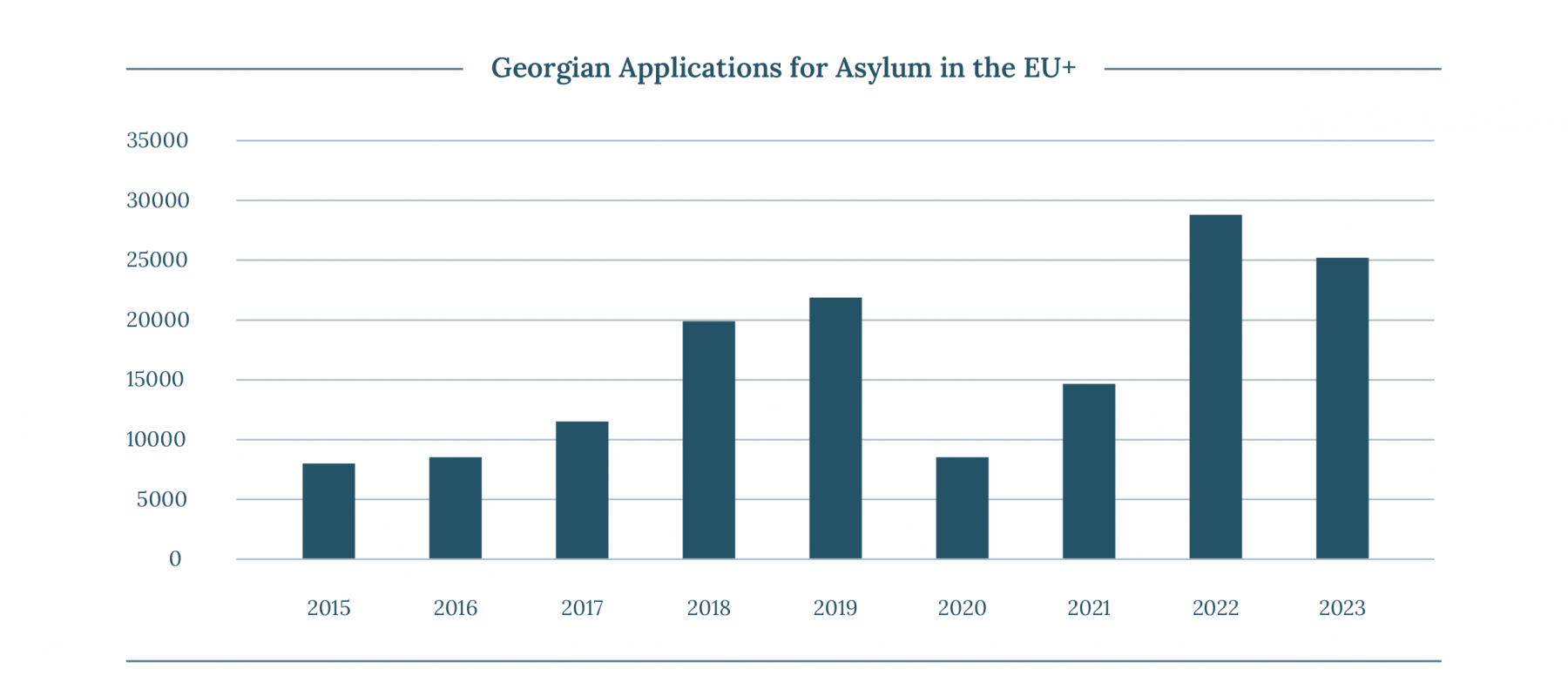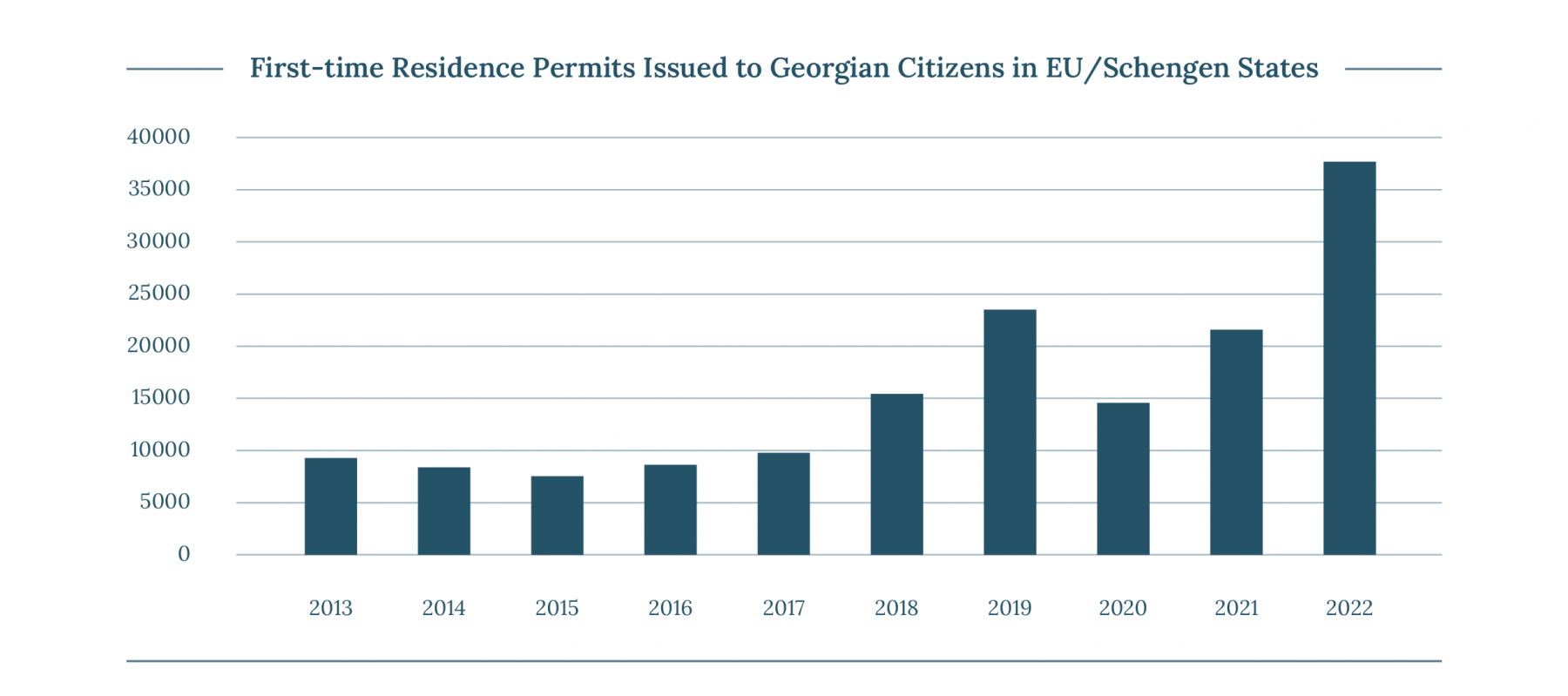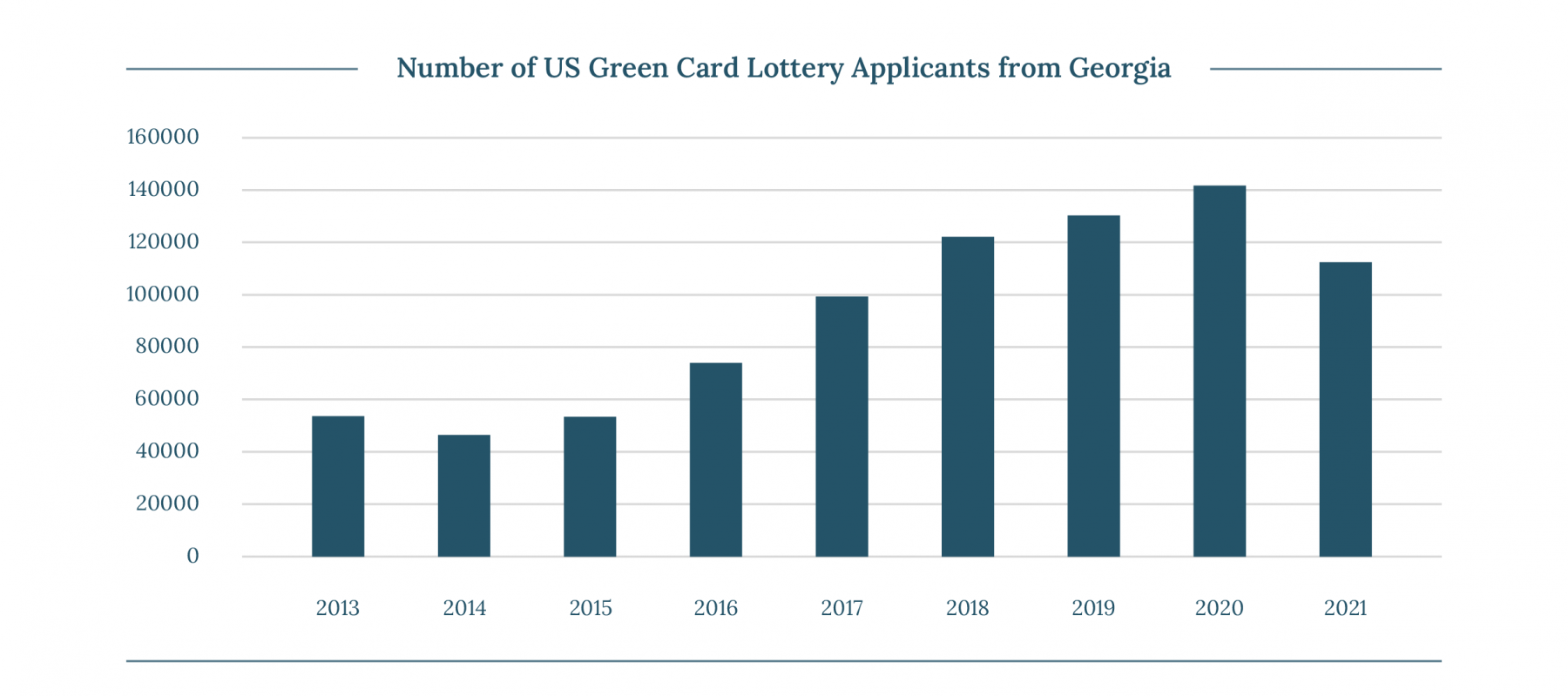Taxation Without Representation: Georgian Migrants as ATMs

In 2014, the National Statistics Office of Georgia stated that the Georgian population was 3.7 million, of which 920,000 were under 17 and ineligible to vote. Hence, 2.8 million voters were residing in Georgia who could cast their vote. In 2021, however, 3.5 million voters were registered. This means that 700,000 voters—a staggering 20% of the voting population - are not residing in Georgia.
700,000 voters—a staggering 20% of the voting population - are not residing in Georgia.
In 2012-2022, 244,966 Georgians permanently left the country. The March 2023 survey conducted by the NDI showed that every sixth citizen of Georgia is also planning to leave the country. Between 2019 and 2023, the number of Georgians with at least one family member abroad increased from 12% to 16%.
According to the European Union Asylum Agency (EUAA) report, there were approximately 180,000 Georgian international migrants in EU and Schengen zone countries in mid-2020, with the EU+ hosting an estimated 21% of Georgian global migrants. The EU+ countries with the highest number of Georgian migrants were Greece (85,065, accounting for 10% of the Georgian international migrant stock), Germany (25,387, 3%), Italy (15,813, 2%), Cyprus (15,201, 2%), Spain (11,824, 1%) and France (8.673, 1%).
According to the official statistics, 54,509 people left Georgia in 2022. Per the EUAA, 25,209 Georgian citizens applied for asylum in EU and Schengen zone countries in 2023. France, Germany, and Italy are the leading destinations for Georgian asylum seekers. In 2022, Georgia was in eighth place after Syria, Afghanistan, Türkiye, Venezuela, Colombia, Pakistan, and Bangladesh, with 26,640 first-time asylum seekers in the EU and Schengen zone. According to the Eurostat data of 2021, 22% of asylum seekers were under the age of 18 years, 35% of applicants were between the ages of 18 and 24 years, 41% were between the ages of 35 and 64 years, and 1 % was over the age of 65.

A recent study by the United Nations Department of Economic and Social Affairs (UNDESA) unveiled that from 2010 to 2020, the number of stock emigrants from Georgia increased by 7% and amounted to 861 thousand – (23% of the country's population). According to the US State Department, the number of US Green Card lottery applicants increased from 31 thousand in 2010 to 112 thousand in 2021. The number of Georgian citizens legally residing in Italy has more than doubled in the last six years, reaching 29,222 in 2023 from 14,603 in 2017 and 7,083 in 2012. The number of legal residents of Poland increased from 500 persons in 2015 to 27,400 in 2022. The statistics of the first-time residence permits issued to the citizens of Georgia in the EU/Schengen zone countries also show a dramatic picture: from 2013 to 2022, 156,371 first-time residence permits were issued to citizens of Georgia.

Fleeing Poverty and Unemployment
Despite Georgia’s double-digit economic growth in 2021 (10.6%) and 2022 (11%), Georgians still face financial hardship, lack jobs, and are poor—the main reason they migrate. Officially, overall unemployment stands at 16.3%, while among the youth (aged 20-24 years), it is 37.3%. Every sixth Georgian (overall 15.6%) lives in absolute poverty, and around 600,000 citizens are receiving social assistance.
When the circular migration scheme between Georgia and Germany began operation in 2021, up to 100,000 Georgian citizens applied for 500 vacancies (mainly in the agricultural field) offered by German employers. In 2019, the chair of the ruling Georgian Dream party and former Prime Minister Bidzina Ivanishvili expressed his surprise that Georgians were expecting him to create jobs. Instead, he recommended his fellow citizens to seek jobs in Europe since, according to him, "no economy can create 2 million jobs in Georgia within 10-20 years."

Georgian citizens go abroad to earn just enough to support their families back home. The remittances increased from USD 1.48 billion in 2013 to 4.4 billion in 2022. The Policy Management and Consulting Group (PMCG) study showed that Georgia's economic dependence on remittances increased notably over the last decade. From 2013 to 2022, the percentage of remittance inflows as a share of the GDP has grown from 11% to 16%. The report of the International Organization for Migration (IOM) puts Georgia as one of the top 20 countries in the world by share of remittances in its GDP. Since 2020, remittance inflow revenues have become the second largest source of foreign currency entering Georgia after export. Remittances are also the second largest contributor to the GDP, just below the manufacturing sector (20%). Georgian emigrants contribute more to the Georgian economy than wholesale and retail trade (13.4%), construction (11.7%), transport and storage (7.1%), real estate (6.1%), or agriculture, forestry, and fishing (6%) (Geostat, 2023).
The December 2022 NDI poll demonstrated that one in three young Georgians wants to emigrate. This shows the lack of hope for the future and deeply rooted political nihilism. According to the NDI, 62% of the surveyed population believe that no single political party in the country represents their interests.
Taxation Without Representation
While Georgian migrants actively contribute to the country's economic growth, their contribution to political life remains minuscule. According to the Central Election Commission (CEC) data, in the 2012 general elections, only 7,814 Georgian citizens living abroad showed up to vote. In 2016, the number of voters fell to 4,816; in 2020, it increased to 12,247. This represents less than 2% of the total number of immigrants eligible to vote.
The main reason for the limited political activism of Georgians abroad is that most illegal Georgian migrants are afraid to be detained and returned home.
The main reason for the limited political activism of Georgians abroad is that most illegal Georgian migrants are afraid to be detained and returned home. Many of them are employed without contracts that require them to work long hours, including weekends, leaving almost no free time for rest, not to mention going to elections.
Since the Georgian legislation does not envisage electronic voting, migrants must travel hundreds of kilometers to voting stations opened in Georgian embassies and consulates in order to cast their votes.
Considering the growing migration trend, providing better opportunities for migrants to vote would be logical. However, the current Georgian authorities are not very enthusiastic about such steps. This skepticism is understandable since the analysis of migrant voter turnout shows that they consistently vote for opposition political parties. In 2012, 53.4% of Georgians living abroad voted for the opposition Georgian Dream party; in 2016 – 60.3% of Georgian migrants voted for opposition parties; in 2020, the figure reached 70.51%.
A growing number of migrants and the experience of Moldova, where migrant votes played a crucial role in the victory of pro-European President Maia Sandu, inspired Georgian political parties to push the government to enable more migrants to vote. In November 2023, several opposition parties launched a campaign called "Ballot Box in Your City," which requested the opening of polling stations in cities without Georgian consulates or embassies.
The European Union also indirectly supports more engagement of Georgian migrants. The fourth step outlined by the EU Commission when granting EU candidate status to Georgia requires Georgian authorities to “finalize electoral reforms, including ensuring adequate representation of the electorate, well before election day." In November 2023, the local NGO Eastern European Centre for Multiparty Democracy (EECMD) and political parties drafted and submitted a bill to the Parliament of Georgia to streamline the ability of Georgian emigrants to vote. If passed, it would allow Georgian citizens living abroad to vote remotely through online systems. However, the Parliament of Georgia has not followed up on this initiative.
The Minister of Foreign Affairs of Georgia was summoned to the Parliament of Georgia on 22 March 2024 to respond to the interpellation of several opposition MPs about Georgian migrants voting abroad. The Minister’s written and oral responses were not surprising: Georgian citizens abroad need to register in consulates, and elections can only be held in the consulates; thus, no changes are to be expected.
As explained above, this approach makes Georgian migrants vulnerable to the migration authorities of the host country. No one wants to be caught and deported on election day—an easy target for those who are after illegal migrants. Further, even if they register, traveling to a far-away consulate on election day involves several logistical hurdles. A person in the south of France or Florida must travel a few hundred kilometers to Paris or New York and back to cast a vote. Most of the Georgian migrants living in Greece work on Saturday, the very day when a general election is scheduled on 26 October 2024.
Unsurprisingly, the current status quo – opposition-minded Georgians leaving the country and unwilling to vote – suits the ruling party.
Unsurprisingly, the current status quo – opposition-minded Georgians leaving the country and unwilling to vote – suits the ruling party. As Levan Tsutskiridze, Executive Director of the Eastern European Centre for Multiparty Democracy (EECMD), put it: “Every Georgian government has seen the emigrant vote as a threat to their position, preferring to treat them as ATMs that give cash and ask no questions.” The exodus of the active and critical parts of civil society, which can no longer speak up on the acute democratic and social problems, suits the government.
Strikingly, however, the family members of opposition-minded Georgian voters who flee the country often still vote for the government. As the NDI poll of October 2023 demonstrated, a higher number of Georgians who have a money-sending family member abroad would rather vote for the ruling Georgian Dream party (16%) than the largest opposition United National Movement party (5%).
If the situation remains unchanged, it is to be expected that a minimal number of Georgian migrants will vote in the upcoming 2024 Parliamentary elections, something that will benefit the Georgian Dream.
If the situation remains unchanged, it is to be expected that a minimal number of Georgian migrants will vote in the upcoming 2024 Parliamentary elections, something that will benefit the Georgian Dream. Therefore, it is doubtful that the government will take tangible steps to engage more opposition-minded Georgian migrants, even if it does not fit the EU conditions outlined in the nine steps. On the other hand, if the EU and the opposition parties were to succeed in pushing or persuading the government to allow Georgian migrants to vote electronically, or at least to ease the consular registration condition and open additional polling stations in a larger number of cities, the “representation” of Georgian migrants would increase, albeit to the detriment of the Georgian Dream’s support. Therefore, since every percentage point will count in the 2024 elections, we can safely assume that the Georgian Dream will not budge.
*The illustration is drawn in the style peculiar to an early 20th century renowned Georgian painter Niko Pirosmani.
